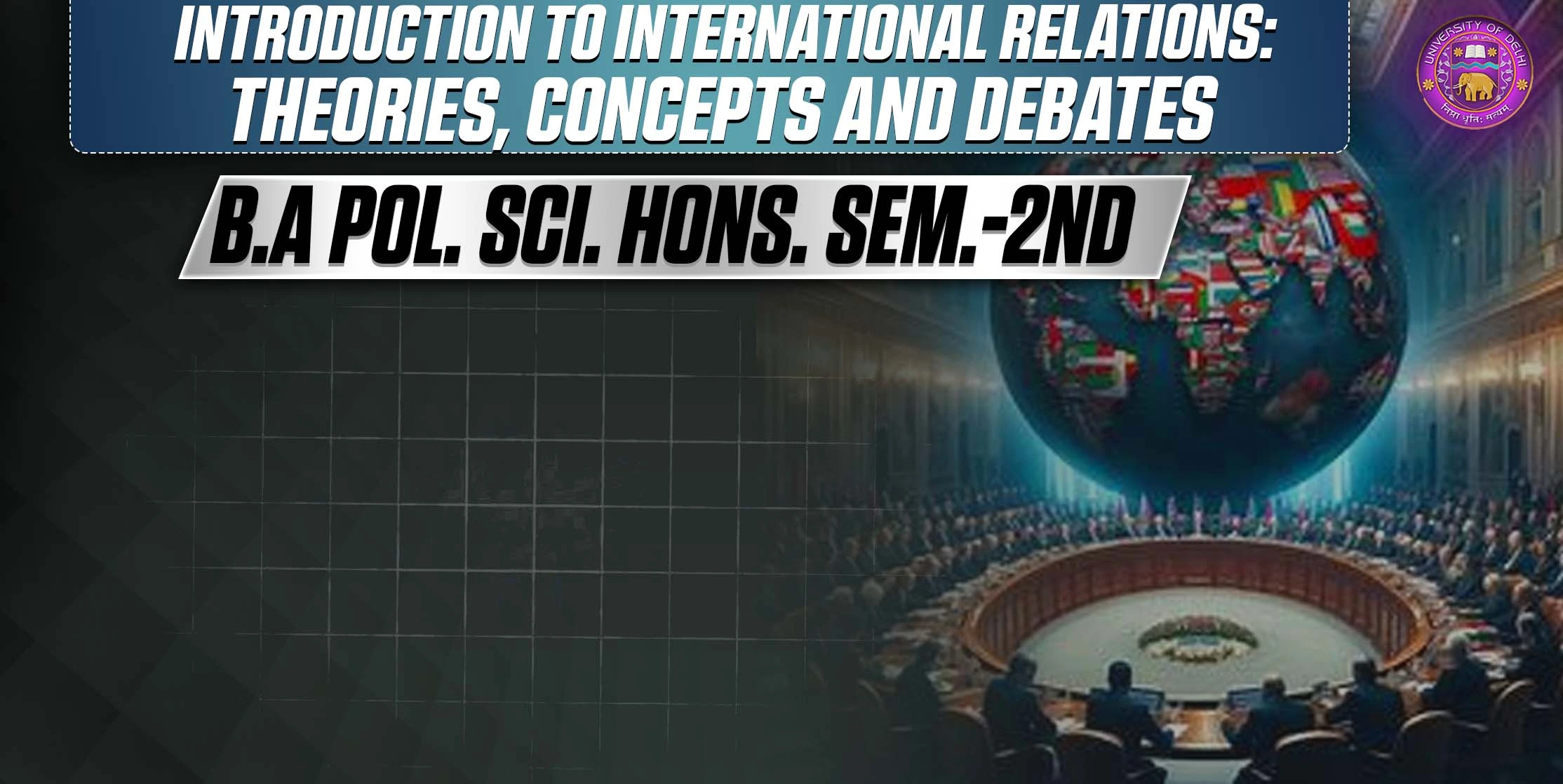
Get in Touch
We will get back to you within 24 hours.
Welcome to MVS Blog

OR
Describe the origin and development of International Relations.
Answer - Introduction
International Relations is an important branch of Social Science. The Scope of International relations is the complex relations existing among the soverign states of the world. It is mainly concerned, among other things, with the study in depth of all events and situations affecting more than one state.
Hans J Morgenthau used the term International Politics and defined it as "International Politics include analysis of political relations and problems of peace among nations.it "is struggle for and use of power among nations".
Politics Among Nations: The Struggle for Power and Peace (1948) is the full title of the book written by Hans J Morgenthau.
International Relations

International relations is the study of the interaction of nation-states and non-governmental organizations in fields such as politics, economics, and security.
International relations can be defined as political activities and other kinds and aspects of interactions among two or more states. The academic field of international relations is a branch of political science that is concerned with the study of relations between states, the foreign policy of nation-states, and the mechanisms and institutions (such as international organizations, inter-governmental organizations, international and national non-governmental organizations and multinational corporations) through which states interact. The study of international relations involves many subjects such as international and regional peace and security, international organizations, nuclear proliferation, globalization, human rights, economic development, intervention, international financial relations, and international trade relations.
Nature of International Relations
The nature of a subject refers to the characteristics of that subject. In that sense, the natures of International relations are in the following:
Changing Nature of International relations
The nature of international relations Is dynamic. International relations is a thorough analysis of what is happening in world politics. The post-World War II period saw a huge shift in world politics. World politics was divided into two poles, such as the NATO led by the USA and the Warsaw Pact led by the USSR. The collapse of the Soviet Union in the 1990s led to a kind of single polarity in world politics. However, economically growing Asian countries such as China, India, Singapore, Vietnam and various South American countries such as Brazil are all significantly influencing world politics. So it is clear that international politics is moving towards multi polar again.
Then growing importance of non-state actors like NGO (Non-Governmental Organization), MNC (Multinational Companies) etc, are also discussed in the field of International relations. International Relations as an academic discipline discusses the changing pattern of contemporary world.
As an Interdisciplinary Subject
All social science subjects are interdisciplinary in nature. International Relations also is an interdisciplinary field of study in which other disciplines in social science such as history, economics, political science, philosophy, geography, culture, etc, are interconnected.
State is the primary actor in IR
In the field of international politics State is the sole and unitary actor. The state has always been a major player in international relations. The state's behavior as a major driving force in international politics is also studied in international relations.
Scope of International Relations
Study of the politics of power struggle:
Hans J. Morgenthau in his famous book 'Politics Among Nations: The Struggle for Power and Peace' (1948) said that 'International relations are the struggle for power among nations.' International relations is the process by which conflicts arise and are resolved through power assertion, mediation, and dialogue on a global scale. Therefore it is very necessary for a nation to acquire power.
In the words of Morgenthau,"International politics, like all political ends, is the struggle for power." Initially, the purpose of international politics was to eliminate war and war, but at present the modern tendency is to understand international behavior on the basis of power. Today every nation has started believing in gaining power, increasing power and demonstrating it. International politics explains this situation to understand and solve the problems of the world in its context.
Foreign Policies of Major Powers:
Foreign policy of the major powers like, USA, Russia, China, European Union (EU), Japan and India constitute the important subject matter of IR. The major power interactions are the driving forces of foreign policy matters. The idea of balance of power, cold war, detente, and new cold war depict foreign policy and their impact on other nation-states, are part of the IR.
Security:
Security is the prime concern of all nation-states. A peaceful and secure international order is always linked to the notion that all the sovereign entities should follow some amount of restriction on their independent actions relating to other. The activities related to bilateral relations like mediation, negotiation, dialogue, talks on disarmament; nonproliferation of weapons of mass destruction and reduction of tension among nations are the prime objectives of IR. Discussion on war and peace, along with strategic thinking in IR is directly related security of any state.
Existence of Non-State Actors:
The importance of non-state actors in the study of IR has increased in the globalized era since 1980s. The actors like Multi-National Companies (MNCs)/Transnational Companies (TNCs); International NonGovernmental Organizations (Green Peace, Amnesty International) exert lots of influence on issues of IR.
Security:
Security is the prime concern of all nation-states. A peaceful and secure international order is always linked to the notion that all the sovereign entities should follow some amount of restriction on their independent actions relating to other. The activities related to bilateral relations like mediation, negotiation, dialogue, talks on disarmament; nonproliferation of weapons of mass destruction and reduction of tension among nations are the prime objectives of IR. Discussion on war and peace, along with strategic thinking in IR is directly related security of any state.
International Political Economy:
The study of foreign political economy focuses on how markets and politics interact, including how markets affect politics and how policies affect markets. With the beginning of Globalization in the mid-1980s, a renewed interest in IPE has developed among scholars.
Importance to politicians:
The principles of ideology of international politics provide knowledge to the politicians, by which they help in solving problems related to foreign policy such as imperialism, colonialism, international trade, globalization of economy, new international order, disarmament etc.
Globalization:
The term "globalization" refers to the increasing interdependence of the economies, cultures, and social activity around the globe because of technology, cross-border trade in products and services, and flows of capital, labor, and information. Over many ages, nations have developed economic alliances to support these movements. But the word gained popularity after the Cold War in the early 1990s, as these cooperative arrangements shaped everyday activities in IR.
International Environment:
Environmental issues have increased concern for states across the globe. The rise of Global warming, melting of glaciers and shortage of drinking water, lessening of forests lead us to think about the one globe we are sharing.
Conclusion
The nature of international relations is changing. Whenever there is a change in the environment, factors and events of International Relations, it is necessary to change the methods and approaches to study it. Moreover, this change is not permanent but continuous. Along with this, it is very complex due to factors, levels, dimensions etc. Therefore, for its smooth study, a very clear, rational, comprehensive approach is required.
0 Response